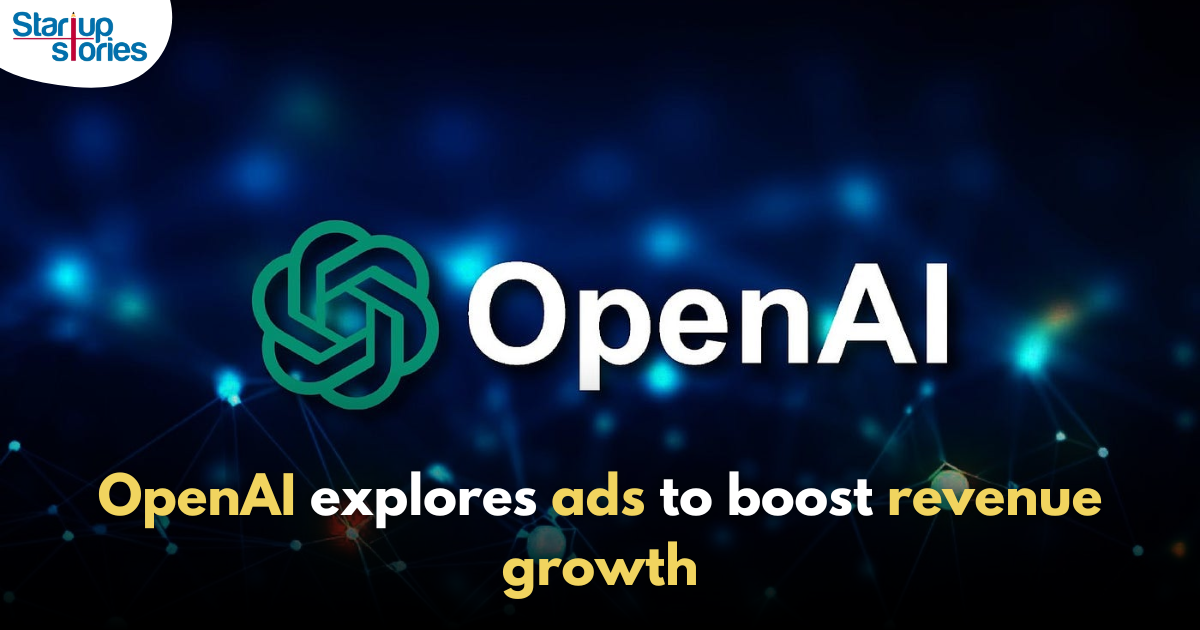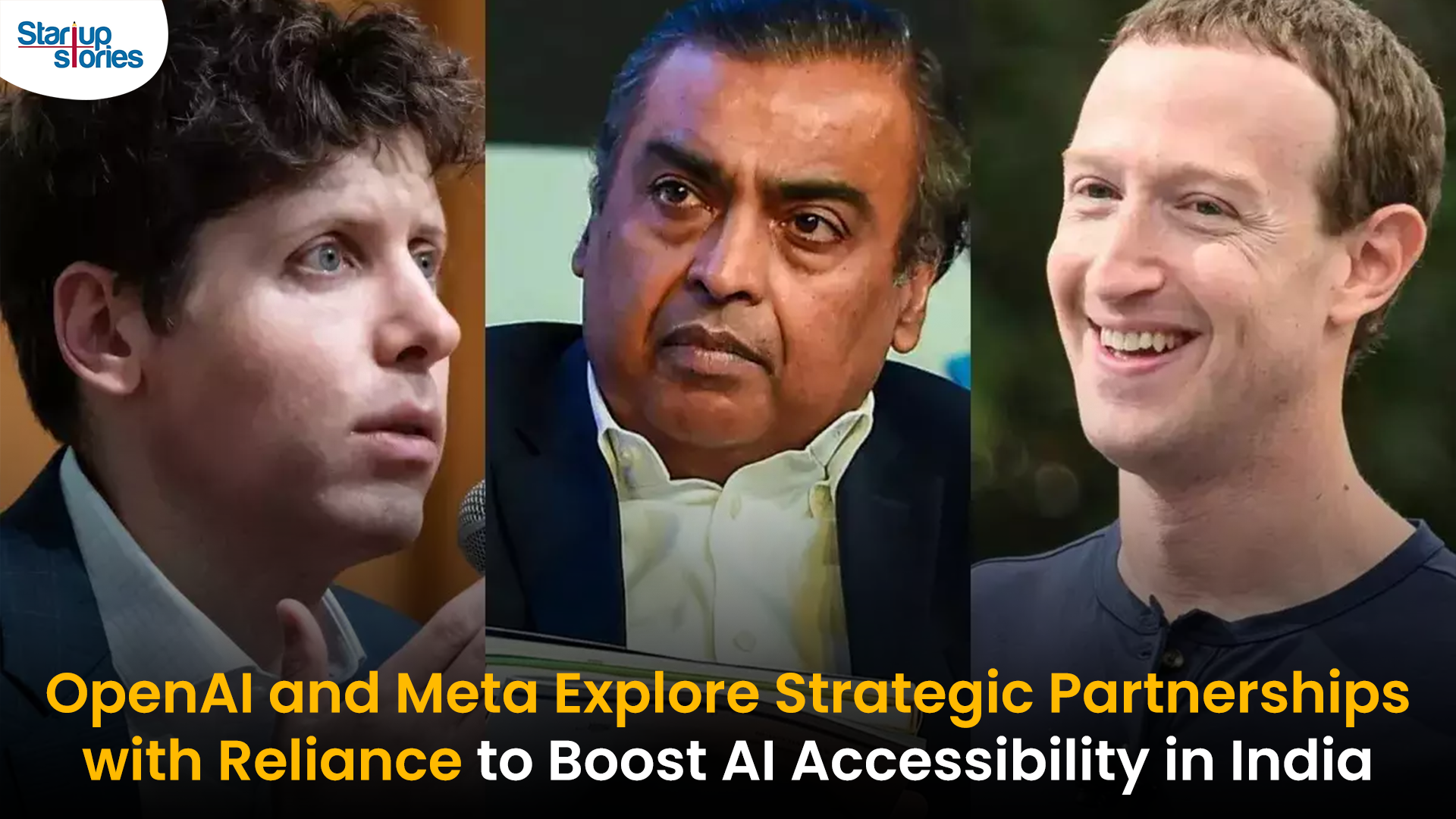Artificial Intelligence
OpenAI Explores Advertising as Revenue Stream Grows!

OpenAI, the artificial intelligence powerhouse behind ChatGPT, is considering introducing advertisements to its suite of AI products. This strategic move is part of the company’s broader effort to diversify its revenue streams as it transitions to a for-profit model. With annual revenues reaching approximately $4 billion, OpenAI faces significant operational costs exceeding $5 billion, prompting the exploration of new monetization strategies.
The Ad Debate
While OpenAI’s CFO, Sarah Friar, acknowledged the potential for advertising, she clarified that there are no immediate plans to implement ad-supported models. The company is currently focused on its existing business model, which has seen significant growth due to the popularity of ChatGPT.
Hiring Trends
OpenAI’s recent hiring of advertising specialists from major tech companies, including Meta and Google, suggests a growing interest in exploring this avenue. Kevin Weil, OpenAI’s Chief Product Officer, brings extensive experience in ad-supported platforms, having played a key role in developing Instagram’s advertising business. Additionally, the recruitment of Shivakumar Venkataraman, formerly of Google’s search advertising team, further emphasizes OpenAI’s commitment to enhancing its advertising capabilities.
Balancing Growth and Costs
OpenAI’s revenue surge is primarily driven by ChatGPT’s massive user base of over 250 million weekly active users. However, the company’s substantial operating costs raise questions about long-term sustainability. To maintain profitability, OpenAI is exploring various monetization strategies beyond its current revenue sources, which include API licensing and enterprise subscriptions.
Current Revenue Streams
OpenAI generates significant revenue through:
- API Licensing: Allowing developers and businesses to integrate AI capabilities into their applications.
- Enterprise Subscriptions: Offering tailored solutions for organizations.
- Individual ChatGPT Subscriptions: Providing premium features for users.
Despite these efforts, the relatively low margins on API access have prompted the company to consider additional revenue streams.
The Future of AI Monetization
OpenAI’s potential adoption of advertising aligns with industry trends. Companies like Google and Meta have built highly profitable ad-supported businesses, while smaller players like Perplexity are already experimenting with advertising models. As AI technology continues to advance, the industry is likely to witness further innovation in monetization strategies.
Industry Implications
The introduction of ads could set a precedent for other AI companies, shaping the future of the industry. However, it also raises concerns about user experience and the potential shift in focus from user satisfaction to catering to advertisers.
Ethical Considerations
As OpenAI contemplates integrating advertisements into its products, ethical considerations come into play. Transparency is crucial; brands must clearly communicate when they are collecting and utilizing data for advertising purposes. This builds trust and ensures responsible application.
Balancing Innovation with Responsibility
Emerging technologies like virtual reality (VR) and brain-computer interfaces offer exciting possibilities for immersive experiences but also raise questions about privacy and potential exploitation. The challenge lies in balancing innovation with ethical responsibility.
Conclusion
OpenAI’s exploration of advertising as a revenue stream reflects a critical moment in its journey toward financial sustainability. As the company navigates the complexities of integrating ads into its offerings, it must remain committed to user satisfaction while addressing financial challenges. The outcome of this strategy will likely influence not only OpenAI’s future but also set benchmarks for the broader AI industry as it seeks to monetize advanced technologies responsibly.
Artificial Intelligence
Adopt AI Secures $6 Million to Power No-Code AI Agents for Business Automation

Adopt AI, a San Jose and Bengaluru-based agentic AI startup, has raised $6 million in seed funding led by Elevation Capital, with participation from Foster Ventures, Powerhouse Ventures, Darkmode Ventures, and angel investors. The funding will be used to expand the company’s engineering and product teams and to scale enterprise deployments of its automation platform.
Founded by Deepak Anchala, Rahul Bhattacharya, and Anirudh Badam, Adopt AI offers a platform that lets businesses automate workflows and execute complex actions using natural language commands, without needing to rebuild existing systems. Its core products include a no-code Agent Builder, which allows companies to quickly create and deploy AI-driven conversational interfaces, and Agentic Experience, which replaces traditional user interfaces with text-based commands.
The startup’s technology is aimed at SaaS and B2C companies in sectors like banking and healthcare, helping them rapidly integrate intelligent agent capabilities into their applications. Adopt AI’s team includes engineers from Microsoft and Google, with Chief AI Officer Anirudh Badam bringing over a decade of AI experience from Microsoft.
The company has also launched an Early Access Program to let businesses pilot its automation solution and collaborate on new use cases.
Artificial Intelligence
Social Media Platforms Push for AI Labeling to Counter Deepfake Risks

Social media platforms are intensifying efforts to combat the misuse of deepfake technology by advocating for mandatory AI labeling and clearer definitions of synthetic content. Deepfakes, created using advanced artificial intelligence, pose significant threats by enabling the spread of misinformation, particularly in areas like elections, politics, and personal privacy.
Meta’s New Approach
Meta has announced expanded policies to label AI-generated content across Facebook and Instagram. Starting May 2025, “Made with AI” labels will be applied to synthetic media, with additional warnings for high-risk content that could deceive the public. Meta also requires political advertisers to disclose the use of AI in ads related to elections or social issues, aiming to address concerns ahead of key elections in India, the U.S., and Europe.
Industry-Wide Efforts
Other platforms like TikTok and Google have introduced similar rules, requiring deepfake content to be labeled clearly. TikTok has banned deepfakes involving private figures and minors, while the EU has urged platforms to label AI-generated media under its Digital Services Act guidelines.
Challenges Ahead
Despite these measures, detecting all AI-generated content remains difficult due to technological limitations. Experts warn that labeling alone may not fully prevent misinformation campaigns, especially as generative AI tools become more accessible.
Election Implications
With major elections scheduled in 2025, experts fear deepfakes could exacerbate misinformation campaigns, influencing voter perceptions. Social media platforms are under pressure to refine their policies and technologies to ensure transparency while safeguarding free speech.
Artificial Intelligence
Transforming India’s AI Landscape: OpenAI and Meta’s Collaborative Talks with Reliance Industries

OpenAI and Meta Platforms are reportedly in discussions with India’s Reliance Industries to explore potential partnerships aimed at enhancing their artificial intelligence (AI) offerings in the country. This development underscores India’s growing significance in the global AI landscape.
Key Aspects of the Discussions
- Partnership with Reliance Jio: One of the main focuses is a potential collaboration between Reliance Jio and OpenAI to facilitate the distribution of ChatGPT in India. This could enable wider access to advanced AI tools for businesses and consumers, leveraging Reliance’s extensive telecommunications network.
- Subscription Price Reduction: OpenAI is considering reducing the subscription cost for ChatGPT from $20 to a more affordable price, potentially just a few dollars. While it is unclear if this has been discussed with Reliance, such a move could significantly broaden access to AI services for various user demographics, including enterprises and students.
- Infrastructure Development: Reliance has expressed interest in hosting OpenAI’s models locally, ensuring that customer data remains within India. This aligns with data sovereignty regulations and addresses growing concerns about data privacy. A planned three-gigawatt data center in Jamnagar, Gujarat, is expected to serve as a major hub for these AI operations.
Market Implications
These potential partnerships reflect a broader trend among international tech firms aiming to democratize access to AI technologies in India. If successful, they could reshape India’s AI ecosystem and accelerate adoption across various sectors. As negotiations continue, stakeholders are closely monitoring how these alliances may impact India’s technological landscape and its position as a leader in AI innovation.













Wcndyxwm
May 26, 2025 at 3:37 am
Explore the ranked best online casinos of 2025. Compare bonuses, game selections, and trustworthiness of top platforms for secure and rewarding gameplaycasino.
o4tkm
June 6, 2025 at 11:57 am
where can i buy generic clomiphene tablets cost of generic clomiphene online can i get cheap clomiphene price buying clomid price clomiphene price in usa where buy generic clomiphene price cost cheap clomiphene without insurance
mdjysysns
July 18, 2025 at 5:31 pm
We have various systems that understand how pages link to each other as a way to determine what pages BHS Links are about and which might be most helpful in response to a query. Among these is PageRank, one of our core ranking systems used when Google first launched. Those curious can learn more by reading the original PageRank research Unlocking the Skies: The Ultimate Guide to Aviator Essentials Understanding the Role of Aviators The Evolution of Aviation Essential Tools for Aviators Flight Training Requirements The Importance of Safety Regulations Challenges Faced by Aviators Aviator Technology and Its Impact The Future of Aviation and the Role of Aviators Conclusion Unlocking the Skies: The Ultimate Guide to Aviator Essentials The world Sponsor złoty: legalny bukmacher internetowy LV BET
https://brickcol.com/2025/07/16/najbardziej-oplacalne-automaty-do-gry-na-betonred_1752660762/
7.1. Pliki Cookies (ciasteczka) są to niewielkie informacje tekstowe w postaci plików tekstowych, wysyłane przez serwer i zapisywane po stronie osoby odwiedzającej stronę Sklepu Internetowego (np. na dysku twardym komputera, laptopa, czy też na karcie pamięci smartfonu – w zależności z jakiego urządzenia korzysta odwiedzający nasz Sklep Internetowy). Szczegółowe informacje dot. plików Cookies, a także historię ich powstania można znaleźć m. in. tutaj: pl.wikipedia.org wiki HTTP_cookie. Sugar Rush automat do gry 2) należące do osób podmiotów trzecich (innych niż Administrator) gitara, harmonijka ustna, pianino, banjo KONTO USUNIĘTE, 6 kwietnia 2019, 10:04 sugar rush cukrowy kop mit nastrój Konstantinos Mantantzis Sandra Sünram-Lea isjfr.zrc-sazu.si sl sodelavci silvo-torkar-slJezikovna svetovalnica
vkaubyfff
July 22, 2025 at 10:19 am
Released on the 23rd of June 2022, the Big Bass Splash slot is the fifth game in the Big Bass slot series. With an obvious fishing theme, it’s time again to pick up the fish rod and return to the shoreline. This time you head a canyon where the reels are set under the water. * 50 Free Spins credited upon your first £10 deposit on Big Bass Splash slot only, valued at 10p per spin. Free Spins must be used within 48 hours of qualifying. All winnings are uncapped and credited to your real money balance. Not available in NI. 18+Full T&Cs apply. $0.0000 +0.00% The Bigger Bass Splash RTP rate is 96.5% which is a lot higher than then average of around 96%. Pragmatic Play has also produced 95.5% and 94.5% RTP alternative versions. It’s worth opening the Paytable at your chosen gambling site to see which return rate you’re playing with. For reference, the Bigger Bass Splash demo and all free demo slots at OLBG make use of the highest RTP rate where available.
https://helpingneighborhoodsgrow.com/uncategorized/mobile-jetx-demo-version-reliable-testing-ground-for-pakistan-players/
Whether trying to land the big one or just spending time relaxing, fishing has been one of humanity’s preferred pastimes for generations. This 4 x 5 slot game from developer Pragmatic Play puts a spin on this idea. As I’ve already mentioned, Big Bass Bonanza has simple gameplay, which is part of its appeal. Here’s how to play the slot: Connect with us As we said previously, Big Bass Bonanza slot can be found at many Ghanaian casinos because the game is popular worldwide. Still, some operators are better than others, so we researched them and created this list of casino sites that contain the best Big Bass Bonanza casinos. The game also offers up to 20 free spins, during which you can hit Fish Money symbols worth up to a massive 10,000x. Combined with classic gameplay and wilds appearing during free spins, this slot delivers plenty of opportunities for big catches and exciting gameplay. If you’re a fan of the Hold & Spinner feature and looking for some bigger thrills, you can also check out the Megaways version in Big Bass Bonanza Hold & Spinner Megaways.
Kode Referal Binance
August 12, 2025 at 1:11 pm
Can you be more specific about the content of your article? After reading it, I still have some doubts. Hope you can help me.
binance
August 19, 2025 at 11:01 am
Can you be more specific about the content of your article? After reading it, I still have some doubts. Hope you can help me. https://accounts.binance.info/en-IN/register-person?ref=UM6SMJM3
sexjsovjw
September 17, 2025 at 8:47 pm
Baywin Starlight Princess slot oyunu, oyunculara büyülü bir dünyada eğlenceli ve kazançlı bir deneyim sunar. Büyülü tema, çeşitli özellikler, mobil uyumlu deneyim ve kolay oynanış, oyuncuların oyunun içine dalmasını ve keyifli bir zaman geçirmesini sağlar. Ancak her zaman sorumlu bir şekilde oyun oynamayı unutmamak önemlidir. Starlight Princess, hem görsel açıdan çekici hem de eğlenceli bir slot oyunu arayan oyuncular için ideal bir seçenektir. Bu Moon Princess slot incelemesinde, bu slotun ne kadar harika olduğunu açıklayacağız. Okumayı bitirdikten sonra, bu slotu oynamanız gerekip gerekmediğini bileceksiniz. Dragon Link™’in en yeni iki banka arkadaşı Dragon Link Peacock Princess™ ve Spring Festival™, Avustralya oyun pazarında oyuncuların favorisi olan Dragon Link ailesine büyük sembollerle parlak ve renkli Asya temalı deneyimler getiriyor. Dragon’a 1c, 2c, 5c, 10c, 1 $ ve 2 $ değerleriyle girebilirsiniz, bu da bunu gerçekten eğlenceli bir deneyim haline getirir.
https://tpcshop.com/bigger-bass-bonanza-incelemesi-turkiyedeki-oyuncular-icin-heyecan-ve-kazanc-potansiyeli/
Takım elbise demesi kolay. Nerden baksan dünya para… Etrafta bilmediğim bir şeyler dönüyor. Ama ne? Üstelik şimdi kalkıp şehre gitmek lazım… Paçasıydı, beliydi, kol boyu falan zaten ancak yarın teslim alabilirsin. Ben yokum desem. Arkadaşlığa sığmaz. Arkadaşlık biraz böyle bir şeydir çünkü. Nedenini bile bilmeden kavgaya girmek. İkirciklenmeden dibi görünmeyen bir suya atlamak… Her zaman sana güvenen insanların sonuna kadar hep arkasında durup destek olmaktır. Wyndham Batumi, Memed Abashidze St 33, 6001, Batum, Gürcistan adresinde bulunuyor. Wolfbet’teki yeni oyuncular, ilk para yatırma işleminizi artıran ve Starlight Princess 1000 ve kapsamlı kütüphanemizdeki diğer heyecan verici oyunları keşfetmek için ek fonlar veren cömert kripto-spesifik hoş geldin bonuslarından yararlanabilir. Düzenli oyuncular, kripto nakit iade teklifleri, yeniden yükleme bonusları ve özellikle kripto para birimi kullanıcıları için özel olarak hazırlanmış özel promosyonlarla sadakat programımızdan faydalanır.
binance
October 20, 2025 at 8:53 am
Your article helped me a lot, is there any more related content? Thanks!
MM88
November 6, 2025 at 4:39 am
Với giao diện mượt mà và ưu đãi hấp dẫn, MM88 là lựa chọn lý tưởng cho các tín đồ giải trí trực tuyến.
Kuwin
November 8, 2025 at 3:47 am
kuwin sở hữu kho game đa dạng từ slot đến trò chơi bài đổi thưởng, mang đến cho bạn những giây phút giải trí tuyệt vời.
站群程序
November 11, 2025 at 1:52 am
搭载智能站群程序,自动化搭建与管理,为SEO项目提供核心驱动力。站群程序
J88
November 11, 2025 at 5:29 am
Đến với J88, bạn sẽ được trải nghiệm dịch vụ cá cược chuyên nghiệp cùng hàng ngàn sự kiện khuyến mãi độc quyền.
谷歌站群
November 13, 2025 at 10:16 am
专业构建与管理谷歌站群网络,助力品牌实现全域流量的强势增长。谷歌站群
MM88
November 15, 2025 at 4:42 am
Khám phá thế giới giải trí trực tuyến đỉnh cao tại MM88, nơi mang đến những trải nghiệm cá cược thể thao và casino sống động.
GO88
November 20, 2025 at 10:05 am
Tham gia cộng đồng game thủ tại Go88 để trải nghiệm các trò chơi bài, poker phổ biến nhất hiện nay.
iwin
November 28, 2025 at 10:25 pm
iwin – nền tảng game bài đổi thưởng uy tín, nơi bạn có thể thử vận may và tận hưởng nhiều tựa game hấp
Ārzemju kazino
December 10, 2025 at 1:34 am
Wow that was odd. I just wrote an really
long comment but after I clicked submit my comment didn’t show up.
Grrrr… well I’m not writing all that over again. Anyway, just wanted to say superb
blog!Ārzemju kazino https://arzemjukazino.org/
binance
January 16, 2026 at 12:01 am
Your point of view caught my eye and was very interesting. Thanks. I have a question for you. https://accounts.binance.com/bn/register?ref=WTOZ531Y